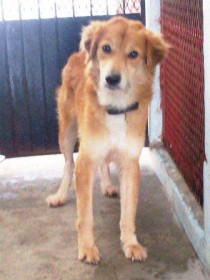Poor absorption of food
Actually, this malady has a scientific name: malabsorption syndrome. Translated, it really tells of a disorder in which the puppy or even the adult dog does not digest its food properly, and therefore the absorption capacity is compromised. Fortunately, the problem does not occur frequently in dogs and cats.

The symptoms of this disease would obviously be a continuous loss of weight until genuine, high grade emaciation can easily be seen.

The animal is concomitantly listless and looks just plain ‘sad’ and undernourished. Because the specific enzymes (for example, those that break down fat) are missing, the stool has a high concentration of undigested fat. Consequently, the faeces may have a rancid odour and the hair around the anus sticks together and has a greasy appearance.
Passing gas
Passing gas or flatulence (flatus) usually accompanies the eating of highly fermentable foods. Beans, onions, cabbage, for example, fall into this category. Scientists have documented (what laymen have always known) that the excess feeding of milk will result in the passing of gas; and diets high in meat content tend to precipitate the passing of wind. I am not so sure that I should mention ‘flatus’ as an ailment, since it occurs under normal conditions. Also, even when it is the result of a bad diet, it can be easily corrected. I should mention that fear and the dog feeling intimidated could participate gas passing episodes. Every vet has experienced this in his/her clinic. One thing is for sure, however, and that is the embarrassment and distress that the continuous passing of gas, at the most inopportune moments, causes the owners of the dog.
The problem can usually be solved by simply changing the diet. Since special gas-forming bacteria must be implicated in this disorder, one might want to introduce a schedule of antibiotics, so that the incidence of all these types of undesirable bacteria in the gut could be reduced. Since the antibiotics are not selective (they will kill several types of bacteria, not only the gas-forming ones), we would have then to re-supply the gut with good bacteria. This can be achieved by introducing yogurt or buttermilk to the diet for a short period (about a week).
Blockage in the intestine
Over the four decades (plus) of veterinary practice, I have surgically removed all sorts of foreign bodies from the intestines. Let me give you some examples which I can recall (surely, I would have forgotten some): pieces of plastic; chicken cage mesh; baby comforters; mango seeds; rubber balls (especially those used in playing the game of ‘Jacks’); old iron; hair balls; cotton reels; plastic bags; pieces of shoe leather; a golf ball (early in my career); and not too long ago, an awara seed (not the first time).
Sometimes, the owner is to blame – leaving objects for the playful, curious puppy to gnaw at, and then to swallow. The oesophagus, which can be expanded, is larger than the intestine, so the object can be swallowed but then it can’t pass through the intestine.
Once these objects are stuck in the intestine, we had better intervene quickly or the puppy (or even adult dog) will die. The area of the intestine in which the foreign body is stuck prevents blood from flowing in the tissue (strangulation).
The three main symptoms associated with a foreign body blockage are:
(1) continuous vomiting especially soon after the food has been ingested;
(2) no stool (faeces) is passed;
(3) loss of appetite. Emaciation and dehydration soon follow. The abdominal area is painful to the touch. The animal contracts the abdominal muscles – the abdomen becomes distended and is as stiff as a board.
The animal later goes into a state of shock, becomes prostrate and eventually goes into a coma before it dies.
Really, there is only one treatment: surgical intervention. Some ‘home remedy’ dog books will tell you to dose the animal with some mineral oil with the hope that the object will be lubricated and the passage made more easy.
This is all humbug and nonsense. Get an x-ray done quickly. In fact, your vet would have administered a barium meal to help confirm the blockage diagnosis and perhaps even to see where the blockage site is. Speed is of essence.
Let’s be clear on this point. Any time you see your pet retching uncontrollably, get him to your vet immediately! Continuous vomiting, like unstoppable diarrhoea, is a major cause of death, especially since it follows so quickly after the onset of the first symptoms.
Please implement disease preventative measures (vaccinations, routine dewormings, monthly anti-heartworm medication, etc) and adopt-a-pet from the GSPCA’s Animal Clinic and Shelter at Robb Street and Orange Walk, if you have the wherewithal to care well for the animals. Do not stray your unwanted pets, take them to the GSPCA’s Clinic and Shelter instead. If you do not wish your pet to have puppies or kittens, you may exploit the GSPCA’s free spay and neutering programme. If you see anyone being cruel to an animal, or if you need any technical information, please get in touch with the Clinic and Shelter by calling 226-4237.




